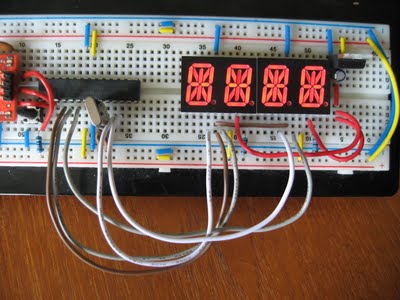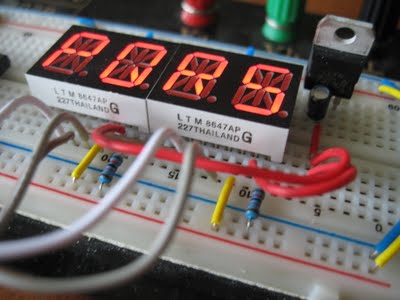Serial enabled 14 segment alphanumeric LED
I purchased two Liteon LTP-8647AP Dual 14-Segment alphanumeric LED from Jameco (about $3 each). These displays are unique in that they have a M5450 chip inside them that allows serial communication, minimizing wires and related chips. The only down side to them is the M5450 does not have a built in character set, and I had to build one by hand.
All inputs are TTL level compatible, but it still needs a 3.3 volt supply for the LEDs. This is some really cool tech, unfortunately, it is tech from the 1980's and these chips are hard to find. I used 12k resistors to control the brightness of the LED's. You might want to go with 10k to brighten them up a little more.
This was one of my first experiments with multiplexing multiple chips. If I am calculating correctly, I could control 90 chips off of one ATMega168 processor. One clock, ten data enable pins, and 9 data pins.
The brown wire on pin 5 is the clock.
The gray wire on pin 6 are the chip select pins.
The white wire on pin 4 are the data pins.
Yellow wires are +5vdc
Red wires are +3.3vdc
Blue is ground
Purchase from jameco.com
Datasheet


As am added bonus, I included code to flip the character set upside down. Then you just need to re-order the data and data enable pins and swap the c1 and c2 in print_led. Up-side down fonts for up-side down chips, a clever solution for a problem that does not exist. Your welcome.
// LITE-ON, LTP-8647AP, 2 digit, 14-Segment Red LED
// Jameco.com, part no. 1955933, $2.95
// http://www.jameco.com/webapp/wcs/stores/servlet/Product_10001_10001_1955933_-1
//
// Code by Scott Cooper
// The code is setup to multiplex the data_pins and the data_enable_pins.
// This allows for a single ATMEGA168 to run up to 100 chips or 200 characters at a time (10x10)
// In this example the first chips is connected to pins 3 and 5.
// The second chip is connected to pins 4 and 6.
// All chips will use the same clock.
// The only pins needed to run the LTP-8647 chip:
// 4 data enable
// 5 clock
// 6 data
// 7 +5vdc
// 8 +3.3vdc
// 9 12k resistor going to Gnd, brightness
// 14 Gnd
const int total_chars = 4;
int clock_pin = 2; // set clock pin
int data_enable_pins[] = {3, 4}; // set slave select pins
int data_pins[] = {5, 6}; // set master out, slave in pins
int font[64];
int c;
char buf[16] = \"\";
///////////////////////////////////////////////////////////////////////////////////////////////////////
void setup() {
// Add 32 to the font index to get the corresponding ASCII value
font[0] = 0; // space
font[1] = 6144; // !
font[2] = 272; // \"
font[3] = 16383; // #
font[4] = 11730; // $
font[5] = 2541; // %
font[6] = 11309; // &
font[7] = 8; // \'
font[8] = 12; // (
font[9] = 33; // )
font[10] = 255; // *
font[11] = 210; // +
font[12] = 1; // ,
font[13] = 192; // -
font[14] = 1666; // .
font[15] = 9; // /
font[16] = 16137; // 0
font[17] = 6144; // 1
font[18] = 14016; // 2
font[19] = 15424; // 3
font[20] = 6592; // 4
font[21] = 9604; // 5
font[22] = 12224; // 6
font[23] = 14336; // 7
font[24] = 16320; // 8
font[25] = 15808; // 9
font[26] = 18; // :
font[27] = 17; // ;
font[28] = 12; // <
font[29] = 1216; // =
font[30] = 33; // >
font[31] = 12354; //
font[32] = 14160; // @
font[33] = 15296; // A
font[34] = 15442; // B
font[35] = 9984; // C
font[36] = 15378; // D
font[37] = 10176; // E
font[38] = 9088; // F
font[39] = 12096; // G
font[40] = 7104; // H
font[41] = 18; // I
font[42] = 7680; // J
font[43] = 908; // K
font[44] = 1792; // L
font[45] = 6952; // M
font[46] = 6948; // N
font[47] = 16128; // O
font[48] = 13248; // P
font[49] = 16132; // Q
font[50] = 13252; // R
font[51] = 11712; // S
font[52] = 8210; // T
font[53] = 7936; // U
font[54] = 777; // V
font[55] = 6917; // W
font[56] = 45; // X
font[57] = 42; // Y
font[58] = 9225; // Z
font[59] = 9984; // [
font[60] = 36; // backslash
font[61] = 15360; // ]
font[62] = 12297; // ^
font[63] = 1024; // _
//flip_font_upside_down();
Serial.begin(9600); // open the serial port at 9600 bps:
pinMode(clock_pin, OUTPUT); // set SCK pin to output
for (int i=0; i pinMode(data_enable_pins[i], OUTPUT); // set CS pin to output
digitalWrite(data_enable_pins[i], HIGH); // hold slave select 1 pin high, so that chip is not selected to begin with
}
for (int i=0; i pinMode(data_pins[i], OUTPUT); // set MOSI pin to output
}
print_led(\" \");
}
///////////////////////////////////////////////////////////////////////////////////////////////////////
void loop () {
// Output entire font.
for (int i=32; i<95; i+=4) {
sprintf(buf, \"%c%c%c%c\", char(i), char(i+1), char(i+2), char(i+3));
print_led(buf);
delay(500);
}
print_led(\"TEST WITH TOO MANY CHARS\");
delay(1000);
print_led(\"caSe\");
delay(1000);
// Quickly dump some numbers
for (int i=2000; i>0; i--) {
sprintf(buf, \"%d \", i);
print_led(buf);
}
}
///////////////////////////////////////////////////////////////////////////////////////////////////////
void print_led (char mystr[]) {
for (int i=0; i spi_out(data_pins[(i+1)/2], data_enable_pins[(i+1)/2], mystr[i], mystr[i+1]);
}
}
///////////////////////////////////////////////////////////////////////////////////////////////////////
void spi_out(int data_pin, int data_enable_pin, char c1, char c2) {
unsigned long working;
if (c1 >= 97 && c1 <= 122) { c1-=32; } // check for lower case
if (c2 >= 97 && c2 <= 122) { c2-=32; } // check for lower case
if (c1 < 32) { c1=\' \'; } // check for too small
if (c2 < 32) { c2=\' \'; } // check for too small
if (c1 > 95) { c1=\' \'; } // check for too big
if (c2 > 95) { c2=\' \'; } // check for too big
c1-=32;
c2-=32;
working = 1;
working = working << 14;
working += font[c2];
working = working << 14;
working += font[c1];
working = working << 3;
// Bits 32, 33 & 34 are not accessible because the long is only 32 bits.
digitalWrite(data_enable_pin, LOW); // set low to enable this led.
for(int i = 0; i <= 35; i++) {
digitalWrite(clock_pin, LOW);
//if(i == 2) { Serial.print(\" \"); }
//if(i == 16) { Serial.print(\" \"); }
//if(i == 30) { Serial.print(\" \"); }
//if(i == 33) { Serial.print(\" \"); }
if (working > 2147483647) { // test the most significant bit
//Serial.print(\"1\");
digitalWrite (data_pin, HIGH); // if it is a 1 (ie. B1XXXXXXX), set the master out pin high
} else {
//Serial.print(\"0\");
digitalWrite (data_pin, LOW); // if it is not 1 (ie. B0XXXXXXX), set the master out pin low
}
digitalWrite (clock_pin,HIGH); // set clock high, the pot IC will read the bit into its register
working = working << 1;
}
//Serial.print(\" \");
//Serial.print(c2, BYTE);
//Serial.print(\" \");
//Serial.print(c1, BYTE);
//Serial.println();
digitalWrite(data_enable_pin, HIGH); // set high to disable this led.
}
///////////////////////////////////////////////////////////////////////////////////////////////////////
// Some sweet little un-necessary bit fiddling and the whole font can be flipped upside down
// Just reorder the data_pins and the data_enable pins, and swap c1 & c2 in print_led
void flip_font_upside_down() {
int newfont;
for(int i=0; i<=63; i++) {
newfont = 0;
if(font[i] & 8192) { newfont+=1024; };
if(font[i] & 4096) { newfont+=512; };
if(font[i] & 2048) { newfont+=256; };
if(font[i] & 1024) { newfont+=8192; };
if(font[i] & 512) { newfont+=4096; };
if(font[i] & 256) { newfont+=2048; };
if(font[i] & 128) { newfont+=64; };
if(font[i] & 64) { newfont+=128; };
if(font[i] & 32) { newfont+=4; };
if(font[i] & 16) { newfont+=2; };
if(font[i] & 8) { newfont+=1; };
if(font[i] & 4) { newfont+=32; };
if(font[i] & 2) { newfont+=16; };
if(font[i] & 1) { newfont+=8; };
font[i] = newfont;
}
}
///////////////////////////////////////////////////////////////////////////////////////////////////////
created: Dec. 1, 2013, 1:01 a.m.
modified: April 13, 2019, 5:09 p.m.
